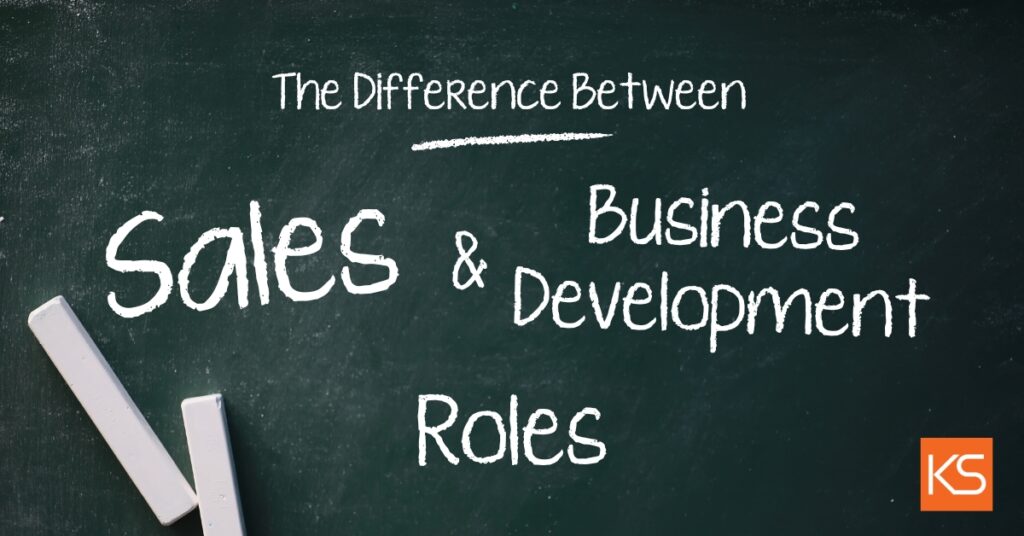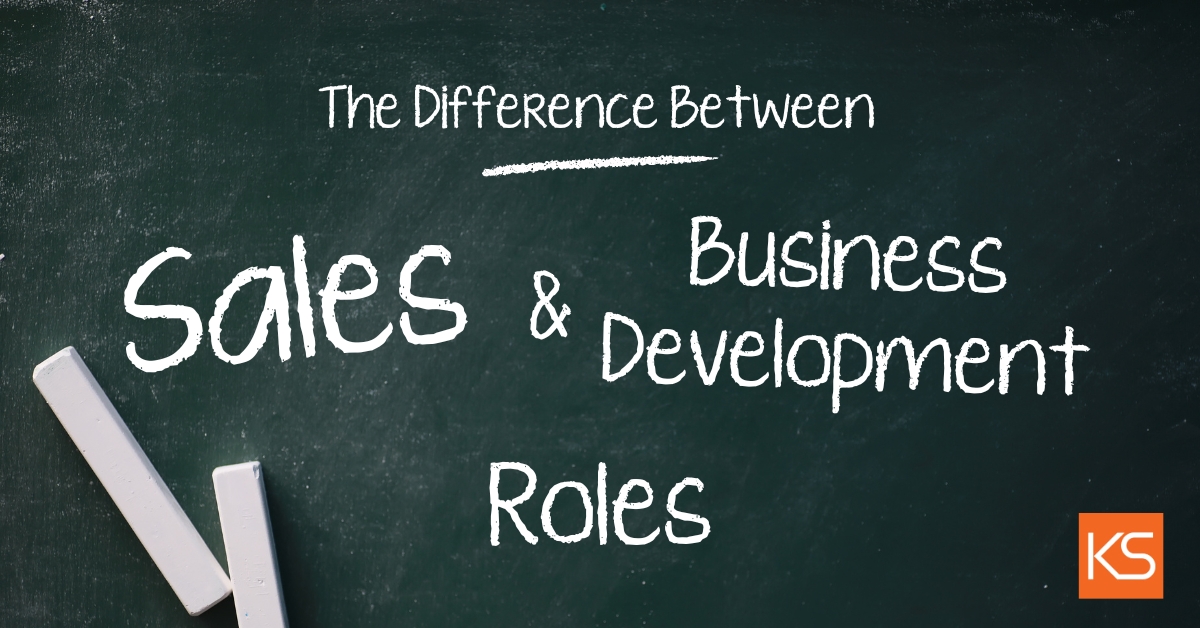The Difference Between Sales & Business Development Roles

In every successful organization, the functions of sales and business development operate as distinct yet interconnected functions. While both contribute to revenue growth, they employ different approaches and operate on diverse timelines.
We’ve outlined the Key Distinctions Between Sales and Business Development Roles
Impact on Company Profits & Growth
Sales is a multifaceted process encompassing timely analysis of leads, thorough research, and effective conversion strategies. It necessitates a seamless flow from identifying potential clients to swiftly directing leads toward closure. The sales function is not only about closing deals but also about understanding customer needs, addressing concerns, and delivering value beyond the transactional aspect.
On the other hand, business development extends beyond the immediate sales cycle, with a primary objective of identifying and capitalizing on growth opportunities. This involves strategic planning, market analysis, and forging partnerships that can elevate the company’s position in the industry. By expanding the business’s reach into new markets, business development ensures sustained growth and long-term success.
Customer’s Perspective
From the customer’s standpoint, sales activities are designed to engage with customers throughout the buying process, involving stages such as awareness, consideration, and decision-making. In contrast, business development focuses specifically on addressing the needs of individuals in the awareness stage. During this initial phase, business development professionals work to create and propose comprehensive solutions that align with the customer’s emerging requirements and preferences.
Consider a scenario where a potential customer becomes aware of a particular product or service. In the awareness stage, the business development team takes the lead, proactively identifying the customer’s needs and formulating tailored solutions. This could involve providing informative content, conducting introductory presentations, or offering preliminary consultations to establish a foundation for the subsequent sales process. On the other hand, the sales team becomes prominently involved as the customer progresses through the consideration and decision stages, facilitating deeper discussions, addressing specific concerns, and ultimately closing the deal.
Impact Timeline
Sales, as a dynamic and day-to-day operational function, plays a key role in revenue generation through the pursuit of inbound leads daily. This involves continuous engagement with potential customers, addressing immediate needs, and closing transactions to contribute to the company’s immediate financial performance.
The impact of business development unfolds over a more extended time horizon, typically spanning months to years. Business development is inherently forward-looking, concentrating on forging strategic partnerships and introducing innovative products or services that may not yield immediate results but are poised to create substantial value over the long term.
For instance, a business development team might invest time in cultivating relationships with key industry players or strategic partnerships with potential referral sources. While the impact of such endeavours may not be immediately evident, but these strategic partnerships can significantly enhance the organization’s market position and profitability in the future.
Current Products vs. Technology Focus
Sales primarily revolve around the promotion and sale of existing products, with a keen emphasis on meeting the immediate needs and demands of the market. Sales teams are engaged in the active promotion, distribution, and sale of established products, utilizing their knowledge of the current product portfolio to drive transactions and boost short-term revenue.
For instance, a sales representative might pitch the latest version of a software application or a recently launched consumer gadget to meet the present requirements of customers. Sales is present-focused, concentrating on current products for immediate consumption.
Compared to sales, business development takes a forward-looking approach by concentrating on leveraging cutting-edge technology to create innovative solutions tailored to future customer needs. Business development professionals invest time and resources in exploring emerging technologies, identifying gaps in the market, and conceptualizing novel products or services that align with anticipated future demands.
Sales Leadership vs Business Development Leadership
Sales managers primarily focus on the day-to-day facets of customer engagement, dealing with inquiries, overseeing product demonstrations, and managing the intricate details of customer interactions. They are instrumental in ensuring the smooth execution of current sales operations, addressing immediate customer needs, and optimizing the efficiency of the sales team. For instance, a sales manager might coordinate a team to handle customer inquiries, organize product demonstrations, and resolve issues arising from ongoing transactions, all aimed at meeting the current demands of the market.
The difference for business development managers is that they are forward-looking, with a strategic focus on the exploration of potential new markets and the identification of innovative products that can pave the way for future sales opportunities. They analyze market trends, assess industry landscapes, and proactively seek emerging markets where the company can expand its footprint.
Transactional vs. Relational
Sales, by its nature, is transactional, primarily concentrating on facilitating immediate exchanges of products or services. This transactional approach often involves one-off interactions where the primary goal is completing a specific sale.
Adopting a relational perspective, business development prioritizes the establishment and nurturing of enduring connections. The emphasis is not on one-time transactions but on fostering long-term, mutually beneficial relationships with clients, partners, and stakeholders. Business development professionals focus on understanding the evolving needs of clients, providing consistent support, and aligning the organization’s offerings with the client’s broader objectives.
For instance, a business development leader may engage in continuous dialogue with key clients, seeking to comprehend their strategic goals and collaboratively developing solutions that contribute to mutual growth over an extended period.
Advantages of Maintaining Sales and Business Development Distinctions
Overcoming Buyer Accessibility Challenges
Maintaining distinctions between strategic growth and sales offers several advantages. One significant benefit is overcoming buyer accessibility challenges. As the sales landscape becomes more complex, this separation allows organizations to address potential clients with a strategic growth mindset, fostering understanding and connection-building before direct sales engagement.
Specialization Efficiency
By separating prospecting and selling responsibilities, each team can concentrate fully on its designated task, ensuring optimal utilization of skills. Business Development leaders can hone their skills in initiating contact and generating interest, while Sales leaders focus on qualification and moving leads through the pipeline, allowing the sales team to concentrate on their core strength of deal closure.
Career Development and Cost Savings
As individuals progress within their specialized roles, the organization benefits from a skilled and experienced workforce that can significantly contribute to its growth. Maintaining distinctions between strategic growth and sales not only enhances operational efficiency but also fosters individual career development and organizational cost-effectiveness, ultimately leading to sustainable growth.
Overall, understanding the differences between sales and business development is crucial for any company aiming to position itself strategically in the market. While sales focus on immediate revenue, business development lays the groundwork for sustained growth and enduring relationships with partners and customers. Emphasizing the separate yet complementary nature of these functions is essential for optimizing organizational efficiency and achieving long-term success.
If you are looking for help hiring sales leaders and business development leaders, reach out to our executive search team today.

